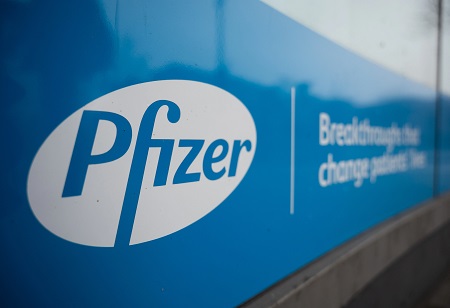India Pharma Outlook Team | Wednesday, 25 May 2022

Pfizer Inc. announced detailed results from two pivotal studies that make up the ELEVATE UC phase 3 registrational programme evaluating etrasimod, a once-daily, oral, selective sphingosine 1-phosphate (S1P) receptor modulator for the treatment of moderately-to-severely active ulcerative colitis (UC). These data were presented as a late-breaker presentation (abstract number 968a) at Digestive Disease Week (DDW) 2022. Both phase 3, multi-center, randomized, placebo-controlled trials achieved all primary and key secondary endpoints, with etrasimod demonstrating a safety profile consistent with previous studies. In the 52-week ELEVATE UC 52 study, clinical remission was 27.0% for patients receiving etrasimod compared to 7.4% for patients receiving placebo at week 12 (19.8% differential, P=?.001) and was 32.1% compared to 6.7% at week 52 (25.4% differential, P=?.001). In the 12-week ELEVATE UC 12 study, clinical remission was achieved among 24.8% of patients receiving etrasimod compared to 15.2% of patients receiving placebo (9.7% differential, P=.0264). UC is a chronic and often debilitating inflammatory bowel disease that affects an estimated 3.8 million people in North America and Europe. Symptoms of UC can include chronic diarrhea with blood and mucus, abdominal pain and urgency. UC can have a significant effect on work, family and social activities. “Etrasimod could offer a differentiated clinical profile for people living with moderately-to-severely active ulcerative colitis considering the clear benefit it has shown over 52 weeks in a treat-through trial design, its mechanism of action, and its unique pharmacologic properties,” said Michael Corbo, chief development officer, inflammation & immunology, Pfizer Global Product Development. “Patients often need multiple options to help manage their disease and there is a significant need for new therapies. In the ELEVATE clinical programme, etrasimod has shown an encouraging balance of efficacy and safety that we believe could have a meaningful impact for patients and physicians, if approved.” The 52-week ELEVATE UC 52 trial utilized a treat-through design which closely mimics real-world clinical practice. Statistically significant improvements were attained in all key secondary endpoints in ELEVATE UC 52. These included endoscopic improvement, symptomatic remission, and mucosal healing at weeks 12 and 52, and corticosteroid-free remission
and sustained clinical remission at week 52. All key secondary endpoints were also met at week 12 in ELEVATE UC 12. These included endoscopic improvement, symptomatic remission, and mucosal healing. Treatment-emergent adverse events (AEs), including serious AEs, were similar between treatment groups in both trials.
The most common treatment-emergent AEs in 3% or more of etrasimod-treated patients and greater than placebo up to week 52 in either trial were headache, worsening of UC, Covid-19 infection, dizziness, pyrexia, arthralgia, abdominal pain and nausea. There were no reports of bradycardia or atrioventricular block as serious AEs. The data from ELEVATE UC 52 & UC 12 are expected to form the basis for planned future regulatory filings, which will be initiated later this year.
Etrasimod was developed by Arena Pharmaceuticals, which was recently acquired by Pfizer. Etrasimod is an oral, once-a-day, selective sphingosine 1-phosphate (S1P) receptor modulator designed for optimized pharmacology and engagement of S1P receptors 1, 4, and 5. It is being investigated for a range of immuno-inflammatory diseases, including ulcerative colitis, Crohn’s disease, atopic dermatitis, eosinophilic esophagitis, and alopecia areata.
ELEVATE UC 52 and ELEVATE UC 12 are pivotal trials that are part of the ELEVATE UC phase 3 registrational programme. ELEVATE UC 52 is a randomized, double-blind, placebo-controlled trial that utilized a treat-through design.
The primary objective of this trial was to assess the safety and efficacy of etrasimod 2 mg once-daily on clinical remission after both 12 and 52 weeks. All patients that dropped out of the study across either treatment arm over the 52-week study was counted as a non-responder.
The primary endpoint is based on the 3-domain, modified Mayo score (MMS). Key secondary measures included endoscopic improvement, symptomatic remission, and mucosal healing at weeks 12 and 52, and corticosteroid free remission and sustained clinical remission at week 52. ELEVATE UC 12 is a randomized, double-blind, placebo-controlled trial to assess the efficacy and safety of etrasimod 2 mg once-daily in subjects with moderately-to-severely active UC.
The primary objective of this trial was to assess the safety and efficacy of etrasimod on clinical remission at 12 weeks assessed by the FDA-required, 3-domain, modified Mayo score. Key secondary measures included endoscopic improvement, symptomatic remission, and mucosal healing. 62.6% of etrasimod-treated patients in both trials and 61.8% and 62.9% of placebo-treated patients in ELEVATE UC 52 and ELEVATE UC 12, respectively, were naïve to biologic or JAK inhibitor therapy.